Saturday, December 09, 2006
S'poreans First? Just a smoke screen lah
Of cos the 1st thing dat comes to my recruit mind is "oh! so all this while u put Sporeans where ah?" Second, third, or fourth?? So now we know! HAHAHaha mini Lee slap himself again!
TODAY got this letter and IMO the person has got it right. I am just going to highlight some parts of the letter...
Gap in citizen logic
Improving S'poreans' welfare without cutting PR benefits may be a better approach
Letter from Ran Xia
I refer to the recent letters debating the new policy for foreigners to pay more in certain essential services, in particular Mr Chia Hern Keng's letter, "Not robbing Peter to pay Paul" (Dec 8), which has untangled the issues and helped clear the air.
Under the new policy, foreigners, including Permanent Residents (PRs), have to bear a higher cost of living — by paying more for education and healthcare — while there is no indication that citizens will pay a single cent less.
Moreover, local employers may have to absorb the additional costs to attract foreign talents. Neither foreigners nor citizens are likely to get any real financial benefit. Some citizens may get the impression that they will pay less because they are Singaporeans, but the size of their bill will remain the same.
(blah, blah, etc)
It is not meaningful to stretch the debate based on who needs who more, or loyalty to the nation. We need one another in this globalised world, while citizenship — either by birth or conversion — does not necessarily guarantee loyalty.
I think the original intention of this new policy was to create a "gap" between PRs and citizens to encourage more foreigners to take up citizenship here.
Let's think in reverse: Wouldn't it be more sensible to increase the welfare of citizens rather than take away what PRs have now? This serves the same purpose but definitely makes citizenship more attractive.
Under the PAP gahmen, prices go up liao will never come down one. Helping to reduce the cost of living is like slicing a pound of flesh from the PAP elites' flesh. WTF man! So once again instead of addressing the root causes of why medical costs and so on are escalating like nobody's business, they chut this pattern saying "see! someone will suffer more than you leh, so better shut up." WTF??
Instead of improve things for Sporeans, they make it worse for another group, as if that will somehow make Sporeans happier and lighten our load?! The logic behind is really KNN man... It is like the GST hike lidat, transfer the burden from the rich to the poor. So it is the same thing here, transfer the burden from Sporeans to non-Sporeans. And who knows maybe along the way the gahmen keep some for themselves! Raise bonuses and ministerial salaries!!
This is precisely why limpeh is skeptical. Becos the GST hike is very unpopular and hard to swallow for Sporeans, so mini Lee needs to placate Sporeans. So throw out this "Sporeans First" bullshit smokescreen. Besides, it is always very effective to play up nationalistic sentiments that put Sporeans vs Non-Sporeans. It is nothing more than a political move rather than a genuine attempt to put Sporeans first.
Thursday, November 30, 2006
Honest mistake means not accountable?
Here is the bit i am skeptical about...
Starting next year, an initiative by Chief Justice Chan Sek Keong could change the complexion of medical negligence cases. All parties can meet before a case begins; patients or their relatives can find out exactly what happened; and, if necessary, doctors can say sorry.
More importantly, everyone can speak freely, because the information exchanged cannot be used in court.
1st thing that cross my recruit brain is... WTF? Imagine i am a doctor suspected of negligence or misconduct.. If i tell you something that you deserve to know, you then cannot use those information if you later decide to pursue an action against my negligence? I mean if a doctor wants to say sorry sincerely then just say it. Why should there be conditions tied in? Of coz if the doctor does not believe there is any negligence, why force the doctor to say sorry? A negligent doctor sooner or later must face the truth and consequences. Why should a doctor be somehow protected? Now it appears that in a case where there is genuine negligence, and the doctor knows it, but by using 'sorry' and 'honest mistake' you can't hold him/her accountable anymore. Can lidat one meh??
This leads me to think about this. According to the news...
In fact, experts said that if the move takes off, there could be less need to go to court at all. The air of mistrust can be cleared, and if an honest mistake has been made, the matter can be settled without relying on expensive litigation.
So expensive legal fees and proceedings is the reason behind this. But straight away there is a loophole. If i make the already expensive litigation even more expensive, wouldn't this push people (especially the poor) towards this new policy? Haha you see anot? Who will actually benefit and be protected??
The question is in the first place why is litigation so expensive?? This means justice lies with those who can afford it instead of those who really needs it. Why not address this to make litigation affordable for all?
If this is part of the law review or whatever review they are doing now, it seems to me once again it is designed to favour the rich and elites.
Wednesday, November 29, 2006
The PAP is clueless, here is an example
I leave the details aside but in a nutshell it says the GST hike will help serve the long term needs of S'pore by attracting more foreign talents and foreign investments.
What is this thing about foreign investments or FDI (Foreign Direct Investments)? No doubt foreigners and FDI did play a vital role during a period of SG's development. But even a chow recruit like me knows that it just does not make sense to keep relying on it. Sooner or later it will harm us more than it help us, like an unhealthy obsession or something. I remember my parents talking about it back in the 80s when i was just a ginna pi. And now in 2006 we are still talking about FDI. It is like ingrained in the national psyche! Of cos the reason we hear so much is becos the PAP talks about it all the time (remember GE 2006?), and now we hear it again to support the GST hike. Endlessly we are told, FDI is good! We need FDI! Without FDI it's the end for you and me!!! (according to the PAP at least)
Of cos the critics think differently. I remember during GE the Workers Party and their non-elite types question the holy grail call FDI. Nabei hor, how dare they question the elites?! Even CSJ, who is not trained in economics, was one of the first critics of PAP's economic policy! I'm sure we cannot listen to CSJ?! The man is mad according the PAP and their media... We must instead listen to our economics wonder, none other than LHL!
But today the truth is finally out. The bullshit about FDI has been debunked by Harvard economics guru Michael Porter. Basically Porter confirms what our oppositions have been saying all these years. "The old formula doesn't work anymore," he says, becos the growth drivers of the past have reached their limit...
1. FDI - S'pore already has the highest FDI intensity in the world. It would be hard for it to go up any further.
2. Singapore's trade — another evergreen driver — reached a point where its size, at $715 billion, was greater than the Republic's $194 billion Gross Domestic Product. It is unlikely the trade sector will grow further.
3. Efficiency - that other buzzword — sounds jaded now. S'pore can no longer compete on being just an efficient place to do business. Increasingly, it has to be a knowledge-based, differentiation-based, innovation-based economy. (And Porter stopped short of pointing out we have yet to make that challenging transition.)
4. And finally, the era in which Singapore's Government could drive its economic development was passe. "Top down from the Government is not working any more," Porter said.
So what do we have to do now? Porter's answers lie in ...
1. A bottom up approach instead of a top down approach.
2. Mobilising the private sector. In other words the small and medium enterprise (SME) and building indigenous capabilities. (dats right! the FT policy is misguided!)
In other words exactly what the oppositions have been calling for all these years. Wow! Our non-elite opposition got world class intellect leh! KNN then how come all the PAP million dollar morons still talking about FDIs and FT crap. They bloody sleeping on the job all these yrs issit?! KNNBCCB!!
So u see the next time you hear some PAP dogs bring up this FDI thing again, you know the person is really an outdated unthinking moron living in the past.
I used to be skeptical and wonder about the capabilities of LHL. Is he really that smart and brilliant like what the media say he is? Now i know there is no need to wonder anymore! After all the clue was there all along.... he was a SAF general, enough said, hehehe.
Tuesday, November 14, 2006
Chao Cheebye GST going up!!!
I am too fucking angry to post a link, instead I will just cut and paste some of the most fucking cheebye rubbish ever to come out from Ass Loong's mouth!
Speaking in Malay, Mandarin and English, Mr Lee explained that the hike was necessary to finance the enhanced social safety nets, needed to help the lower income group and he emphasised that the offset package would more than counter the rise in GST.
Hey fuck you Ass Loong! Can come up with a better excuse or not?! Your cheebye world highest PM salary take out and donate to help the poor lah motherfucker!!! You want to offset simi lanjiao? KNN typical SAF paper general style, LPPL, create extra work for the sake of looking busy!
While Singapore's current model to tackle the widening income gap is sound, Mr Lee said the government would take on two approaches to deal with the new environment - to strengthen the safety nets and tilt the balance in favour of the lower-income groups who do not benefit from the fruits of economic growth.
To do this, government spending will have to go up. The government now spends some 15 percent of its GDP - one of the lowest in the world.
What the fuck is this magic number of 15 percent??! Who decide one?? Why cannot spend more than 15%? How about increase to 20%? Like this won't need to increase GST right?! KNN see i have hit upon a solution liao, straight forward and simple, no need to create extra work for these dumb fuck civil servants.
And where is the rest of the 85%?? You makan shiok shiok liao ah?! Or throw into failed ventures overseas? Shin Corp??
"It's part of being one society. I'm not going to tax 15% on income tax, I'm not going to tax 25% from GST the way the Scandanavians do, but I have to make the adjustments of 2% which I think is fair and I think Singaporeans will support," added Mr Lee.
Hey Ass Loong, u forgot this is Uniquely Singapore ah? Why use other countries to compare?? This Singaporean here got this to say in your sissy face. "IT IS NOT FAIR AND I DON'T SUPPORT THE GST HIKE!"
KNNBCCB go to hell PAP!!!
Monday, November 13, 2006
The Law protects the Elites
However I find one big element that is glaring in this Penal Code Review. I notice all the changes to the law are targeted towards what I call Blue Collar crimes. They are going to make punishments harsher and fines heavier. But what about White Collar crimes? I see no mention of changes to White Collar crimes. Maybe there are but so far I don’t see any reports or news. And no bloggers touch on this angle yet.
So it seems the Law Review targets the weak and the poor and the masses. It doesn’t target crimes that elites are likely to commit. Example corruption, corporate fraud, embezzle money, graft and so on. Not even expanding the scope, I think the punishments also remain the same. So you see the elites are getting away with it protecting their own kind.
If I change the law and say from today onwards if you commit fraud or steal money worth more than a peanut ($600k), the punishment will be death sentence. Straight away I tell you there will be no more cheating and corruption. Deterrence mah, as PAP always like to use as justification.
And this will be very effective don’t you think? Instead of having to pay millions to entice people not to be corrupted, now those who want to try some funny business will seriously think hard before trying. And white collar crimes are committed by people who are smart and educated, so they should be able to use their brains and think. If they still want to go ahead and commit white collar crimes then they cannot siam and say things like “oh, it was a moment of folly”... or “I lost my head there for a moment” kind of lame excuses.
Just take NKF and Durai for example. He was a lawyer and knew the law. This kind of smart educated people is 知法犯法 so his punishment should be tougher than say someone who spoke without a public permit or a pickpocket. In fact the Penal Code Review should emphasize on people like them and their crimes becoz this kind of elites are rich, knows the right people, and can hire expensive lawyers to argue their guilt away. Likewise if a minister or MP is found to be corrupted or commit white collar crime than their punishments must be double or triple or even life imprisonment or death! If Durai and Mathilda knew that they will be hanged for stealing peanuts I’m sure things would be different. This is a good becoz it also serves as a filter and sieve out those whose hearts are not in the right places especially when it comes to public office.
But instead of being tougher on white collar crimes the gahment does absolutely nothing on this category of offenders. This goes on in S’pore all the time and is not a new thing.
Take the SAF for example, recruits and privates and NCOs are subjected to charge or sign extras at the whim and fancy of their officers. But what happens when a Captain does something wrong? It is rare that the Captain’s superiors (Major, Colonel etc) will want to destroy a fellow officer’s career. So it is usually a harsh verbal reprimanding for wayang, sign some harmless extras and after that covered up. Why not charge the officer?? Why not demote the bugger or throw him in detention barrack?? It is only fair that leaders who fail in their duties must bear heavier responsibilities. But we all know such is not the case.
So you see from the SAF to real life, there is always a class-divide. The elites look after their own not only becoz of self-interests, they do so and deliberately use the law to penalize the non-elites becoz they are fearful of the masses.
S’pore consistently ranks high on being clean and non-corrupt, but who are the people who are voting in such surveys? It is always the bosses, the elites, the foreigners etc who are least punished if they do something wrong. And if the law punishes a non-elite for causing offence to an elite, than all the better and S’pore must be a wonderful place to do business!
Saturday, November 04, 2006
Despot talk cock sing song again
Shorter-term leaders?
MM Lee says future leaders may not remain in office beyond 20 years
Derrick A Paulo
WHEN Minister Mentor Lee Kuan Yew visited the chairman of ExxonMobil last month, he was offered a glimpse of how Singapore may have to manage leadership succession in the future.
In Texas, the oil giant's headquarters were "so much more attractive than the White House", Mr Lee found.
"I then realised why the best leaders in America go to corporations, not into government," he said. "The attractions of a private career and a private life are stupendous."
Aha! But a career in public office is not the same as one in a private profit-driven corporation. To lump the two together shows a lack of basic understanding of what is public office. The starting point and motivations are different. I think he always wanted secretly to be a successful CEO and make it big in business, like Wee Cho Yaw and all that. But because he can't, so he installed himself as Chairman of GIC and play businessman there. Obviously he is not good at it, and must have wasted a lot of money in bad investments and failed ventures, which is why the books of GIC remains a secret and all hush hush.
It is a scenario Singapore may face in the next 20 to 30 years, if the economy keeps growing and the country is more secure financially. One solution to ensure that governance standards do not slip would be to give successive leaders shorter terms in office, believes Mr Lee.
Between 10 and 20 years — that is how long he hopes they will stay at least, "because you need two to three terms to really master the art of government".
But, any longer and the prospect of heading the Government of Singapore Investment Corporation — with offices across the globe — may become more appealing than heading the Singapore Government, said Mr Lee, speaking at the launch of the LKY School of Public Policy's inaugural book, Managing Globalization: Lessons from China & India.
However, he ruled out hiring "foreign talent" to run the country, after he was asked by a Singaporean student of the school if it was a possibility.
"No … you must have the passion, you must have the commitment, you must share the dreams of the people," he replied.
Aha! So in one big sweep he just condemed all who are not in public office as lacking the passion, commitment and don't share in the dreams of the people. So what about Temasek and GIC? They are corporations and not government. So now we know why Temasek is fucking up so badly in Thailand! Hahaha!
Although Singapore is grappling with a widening income gap, and globalisation has led to signs of a dual economy, Mr Lee believes that everyone can still gain from economic growth.
He likened the country's wealth distribution to a tennis or golf tournament.
"The big prize is always number one, then number two, number three, but in fact, all those who have participated do get something; otherwise, they won't come back. They have expended time and money, got their golf clubs or rackets," he said.
"It's important to give everybody a sense of having participated in the national effort. We reward you with a decent life. How much of a decent life will vary with how magnificent the result of the total effort."
The Government's approach is to keep seeking out the right balance between competition and compassion. "If you have too much of the yang, highly competitive, your society will have a certain amount of friction. If you have too much of the yin, you'd have lost your drive," he said.
Many of the school's international students among the 300-strong audience were hoping to hear Mr Lee's and Singapore's prescription of yin and yang for their own societies.
For him the bedrock of development is security, stability and a system that rewards learning and hard work. But he stressed that it was up to them to "get (their) countries in order".
While Singapore after independence "grafted" 70 to 80 per cent of its approach to government from good practices around the world, he estimated, the 20 to 30 per cent of local experience is no less important.
"I listen to all the advice I get … some unsolicited, especially from well-meaning academics. But you don't know me, and my conditions, and I know that's not applicable. So, we do what we know will work," he said.
So despot, you KNOW everything ah? KNOW, KNOW, KNOW, KNOW. What do you KNOW? Not only are you arrogant, you make yourself look stupid. No wonder your party is filled with equally arrogant idiots like your son, monkey Tan, Wee Siew Kim, Wong Cunt Sing, Ng Eng Hen, Lee Boon Yang etc... too many to name liao. Bloody worms all.
Monday, October 09, 2006
FEER October issue
October 2006
The Singaporean government’s recent decision to ban the REVIEW and the defamation lawsuits against us by its two most powerful politicians take us back to a time when the city-state was a poor speck of a country sitting on one of the fault lines of a fractious region. Besieged from without and within, the government of the young People’s Action Party resorted to Draconian colonial-era laws to crush dissent. Today, Singapore is an affluent and peaceful society with ample means to protect itself, and its Southeast Asian neighborhood has progressed from confrontation to cooperation. So why is it still using repressive measures against a monthly magazine that employs a total of three full-time journalists and has 1,000 subscribers in the country?
The July article that started this most recent dispute with Singapore, “Singapore’s ‘Martyr,’ Chee Soon Juan,” sought to raise a similar question, only it focused on the methods used to silence the leader of the opposition Singapore Democratic Party. We put it to Mr. Chee himself, and he laid the blame squarely on the country’s founding Prime Minister Lee Kuan Yew, who now holds the title of “minister mentor.”
The ruthless suppression of dissent must be kept up, he said, because as long as Mr. Lee is alive, a new generation of leaders is unable to emerge and distance themselves from his record. Mr. Lee’s past actions, which have led to human rights abuses and statist management of the economy, haunt the government. Mr. Chee believes that is the true reason dissidents like himself are hounded: “If we had parliamentary debates where the opposition could pry and ask questions, I think he is actually afraid of something like that.”
After the article was published, we received letters from Davinder Singh, a lawyer for Mr. Lee and his son, Prime Minister Lee Hsien Loong, claiming that these sentiments and several other sections of the essay defamed the two men. Mr. Singh demanded apologies, removal of the article from our Web site, and an undertaking to pay damages and legal costs.
We did not comply with these demands, and proposed instead to publish a clarification that the REVIEW did not intend the article to express the defamation alleged by Mr. Singh. After several rounds of correspondence with Mr. Singh, all of which is posted on our Web site www.feer.com, we heard nothing more for 10 days. Then the Singaporean Ministry of Information, Communications and the Arts announced new conditions to be imposed immediately on the REVIEW, requiring us to appoint a legal representative in Singapore to accept lawsuits, and post a S$200,000 ($126,000) bond to cover damages from such lawsuits—even those relating to already published articles—if we wished to continue circulating. This order had no basis in Singapore’s own law, which stated clearly that such regulations could be imposed only on publications that publish at least weekly or which have been found to have engaged in domestic politics. We have also posted all of our correspondence with the ministry on our Web site.
The timing and substance of this move were in our view no coincidence. It followed hard upon our refusal to apologize and pay damages. Moreover, to sue the REVIEW in Singapore, the Lees would have to serve the papers in Hong Kong, where the magazine is based, since we do not have any employees in Singapore. This means we could challenge that service and/or the enforcement of damages in Hong Kong.
With Singaporean efficiency, the government bureaucracy leaped into action on the Lees’ behalf, imposing conditions with retroactive effect in order to force the magazine to put its head on the block for the Lees to chop off. When the REVIEW refused to comply with these conditions, the Lees proceeded with their lawsuits anyway. This episode tells us much about the use of official power to chill free speech in Singapore.
The Lees’ court filings of Aug. 22, which we have posted on our Web site, claim that the REVIEW article carried the message that Mr. Lee Sr. is “unfit for office because he is corrupt.” We believe that no rational subscriber to this magazine would read the article in the way the Lees allege. Reporting an opposition MP’s claim that a leader’s policies may have led to human-rights abuses and the concealment of government errors is very different from alleging he is corrupt. Mr. Lee’s probity is legendary; we do not believe that his faults include personal corruption, and it strikes us as fantastical to allege that such an allegation was made by the REVIEW.
The lawsuits also make reference to the section of the article that notes “Singaporean officials have a remarkable record of success in winning libel suits against their critics. The question then is, how many other libel suits have Singapore’s great and good wrongly won, resulting in the cover-up of real misdeeds? And are libel suits deliberately used as a tool to suppress questioning voices?” The lawyer claims that this means that Mr. Lee Sr. “has set out to sue and suppress those who would question him as he fears such questions would expose his corruption.”
Mr. Lee certainly has an impressive record of suing his critics, as do other Singaporean officials, but since we don’t believe he is corrupt, we could hardly have meant that these lawsuits were intended to conceal corruption. Rather we asked the question, one that is legitimate and in the public interest, whether Singaporean officials have used libel lawsuits as a tool to suppress legitimate criticism.
Even defending oneself vigorously in Singapore can incur punishment. For instance, in a case involving a REVIEW article from 1987, a London queen’s counsel vigorously cross-examined the prime minister. After finding for Mr. Lee, the court awarded him aggravated damages in part because the barrister’s questions were calculated to “increase the hurt to his feelings.”
Finally, the Lees’ lawsuits against us allege that the REVIEW defamed them by referring to the scandal of the National Kidney Foundation and Chief Executive T.T. Durai. We noted that this case was exposed only because Mr. Durai, having prevailed in one defamation case, filed a second against a major bulwark of the regime, Singapore Press Holdings, which he lost. The obvious and legitimate question asked by the opposition is, how many more Durais are there in Singapore officialdom who are getting away with abuses because of the lack of an independent media and a vigorous opposition?
Corruption undoubtedly exists in Singapore, as the National Kidney Foundation scandal shows, but asserting this is not a slur—no country is entirely free of this taint. The key thing to watch is whether a government uses sunlight as a disinfectant, or sweeps its errors under the rug. Singapore’s use of press restrictions and politically motivated libel actions makes us wonder whether its reputation for clean government is deserved. For instance, in July, Minister Without Portfolio Lim Boon Heng encouraged the local media to focus more on good news and stop trying to uncover abuses: “If you want to do investigative reporting, there must be something which is wrong which has not been attended to. I think there are not many issues in Singapore that fall under this category.”
Mr. Lim’s words reflect Singapore’s deliberate program to neuter the domestic and international media. Over its 60 years, the REVIEW has often borne the brunt of this campaign. In a 1995 column for the Independent newspaper, the late Derek Davies, a former editor, recalled that in 1976 Mr. Lee Sr. threatened the magazine with ruin if it commented on sensitive matters. Then in 1985, Mr. Lee confided he had a new plan:
“He told me that he was determined to set things straight with the foreign press before he handed over power to the younger generation,” Mr. Davies wrote. “He was drafting a new press law aimed at the pockets of owners and publishers, not editors. If any publication was deemed to be ‘engaging’ in Singapore’s domestic politics, its circulation (and its profits) could be cut to a trickle, while denying it the right to claim it had been banned.”
The new law was passed in 1986, and as a commentator noted in the Times of London the following year, there was little doubt what engaging in domestic politics meant: “As a rule of thumb, any article with which Singapore disagrees and which does not carry its views is deemed to be an interference in its internal affairs.” It wasn’t long before the REVIEW fell afoul of the stricter standard. In 1987, Mr. Lee sued for libel over its coverage of the detention without trial of Catholic social workers, claiming he was portrayed as intolerant of the church and religious freedom. The government restricted the REVIEW’s circulation to a tiny number, and when Mr. Davies withdrew all distribution, it pirated the magazine with the advertisements blacked out.
Sadly, the government’s efforts at controlling coverage of Singapore have been largely successful. For local journalists, whose coverage is controlled by the government through Singapore Press Holdings, resistance is futile. And given that Singapore represents an important market for media in the region, many foreign publications are wary of offending the government. Correspondents who want to tackle controversial subjects find that even carefully nuanced articles involve so much back-and-forth with the lawyers that the effort hardly seems worthwhile. When something critical does make it into print, the appearance of a letter from Mr. Singh demanding an apology and damages has in recent years too often resulted in immediate capitulation.
We respectfully submit that balanced coverage of Singapore in the international media requires deeper reporting and tougher analysis of government actions, as well as an occasional opportunity for opposition politicians to speak for themselves without fear of financial ruin. This is one reason for the REVIEW’s decision to defend itself against these latest defamation suits.
In this issue, academics Michael Barr and Garry Rodan take on two taboo subjects in Singapore: the racial composition of its educational system and the government’s control of the local media. Mr. Barr examines whether Singapore’s claim to be a meritocracy stands up to scrutiny given the striking inequality between the races as shown by the educational advantages enjoyed by ethnic Chinese. Mr. Rodan looks at how the government controls the flow of information for the purpose of protecting and reinforcing the founding myths of the PAP regime.
These articles go straight to the heart of some of the most sensitive issues the Singapore government doesn’t want discussed: race, language, religion and culture. These topics are sometimes said to be “out of bounds.” As Mr. Lee Sr. once explained, “They are not cerebral matters which we can discuss in a Western salon. In our society, these are visceral matters. People take their religion very seriously. It is extremely dangerous to treat this just as another conversational subject.”
Mr. Lee apparently still sees the country he shepherded to independence as fragile and vulnerable. Yet having enjoyed almost 40 years of PAP rule, Singapore has had plenty of time to tame its ideological and racial demons. If after four decades the society remains so volatile that one can’t even discuss sensitive topics openly, the government must have failed in its duty to build a harmonious society.
We don’t think that’s the case. There is much to admire in Singapore’s development under the PAP, and the REVIEW has a responsibility to its readers to provide a balanced view of this record. When honest criticism is forbidden, however, balance is hard to attain. We come back to Mr. Chee’s appraisal that the real impediment to Singapore’s emergence as a self-confident, pluralist society is Lee Kuan Yew himself. After all his contributions, the minister mentor is tarnishing his legacy with attacks on the REVIEW, the international and regional press, Mr. Chee, and others who pose no threat to Singapore. We believe most Singaporeans recognize this and yearn for a fully free democracy. We look forward to that day, when we hope the REVIEW will circulate in Singapore once more.
H.R.
FEER strikes back!
October 2006
By Garry Rodan
The Singapore government hoped for significant returns when it invested approximately $85 million to host the September 2006 meetings of the International Monetary Fund and World Bank. And this seemed like a reasonable expectation. After all, the 16,000 delegates represented a captive audience to promote the Singapore’s finance and tourism industries.
What transpired, however, was a public-relations disaster for the ruling People’s Action Party. Singapore’s extensive curbs on political expression were to consume much of the international media attention before and during the meetings.
Home Affairs Minister Wong Kan Seng warned that public protests may “attract severe punishment, including caning and imprisonment.” Under Singapore’s Public Entertainment and Meetings Act, a security permit from police is required for more than four people to gather in a public place. Authorities claimed that outdoor protests would disrupt local residents and could be exploited by terrorists.
Far from winning new admirers by hosting the meetings, Singapore’s authorities managed to alienate existing ones. Leading American neocon Paul Wolfowitz, now president of the World Bank, slammed immigration restrictions on activists as “authoritarian.” Mr. Wolfowitz accused Singapore authorities of reneging on a 2003 agreement to allow attendance of accredited activists, adding: “Enormous damage has been done and a lot of that damage has been done to Singapore, and it’s self-inflicted.” Belated approvals for 22 of the 27 banned activists to enter Singapore limited—but didn’t undo—the damage.
Many international NGOs conducted their activities from the nearby Indonesian island of Batam. Meanwhile, international media attention turned to the attempted illegal march and rally by Singapore Democratic Party leader, Chee Soon Juan, and six others to highlight curbs on freedom of speech, association and assembly. Encircled by 30 police, the protesters were physically prevented from even beginning their march from a city park. Without taking a single step they had proven their point and the government’s contempt for voices of protest was vividly projected to the world.
Additional limits to political expression in Singapore are imposed through stringent media regulation and frequent litigation by government leaders. None of this is abating. Indeed, this publication was recently banned in Singapore, as editor Hugo Restall explains in this edition. But why does the ruling PAP persist with such tight controls over expression given that it enjoys widespread political support inside and outside Singapore? How can we understand the sorts of pr disasters described above?
Any attempt to answer these questions needs to grasp that suppression of dissent in Singapore is discriminating. The PAP has over the last four decades displayed special anxiety toward certain criticisms and scrutiny, while it is less severe in its reactions to others. In particular, it reacts robustly to questioning of the PAP’s governance virtues and the integrity of the political, legal and bureaucratic institutions it has crafted. It is especially protective of two foundational myths of the PAP, which provide the rationale for the ruling party’s monopoly of power.
The first myth is that public institutions are autonomous, efficient and administered by a meritocracy. In this construction, the integrity of any institution is directly linked to the character of its officials and vice versa. The second posits that unless all politics is channeled through clearly defined and regulated formal political institutions then Singapore’s social and political stability will be at risk. This concept of politics is a compartmentalized and highly regulated one.
However, the veracity of such defining stories about the essence of the regime’s character and purpose are impossible to fully ascertain given the constraints on inquiry and debate into them. This is not by accident, since if these myths could not hold up to scrutiny then the rationale of the de facto one-party state would be undermined. Insulating these myths from scrutiny may reflect a lack of confidence in the ability of Singaporeans to assess competing claims about key institutions. It might also reflect a lack of confidence in the ability of the institutions to withstand critical scrutiny. Whatever the case, reinforcing foundational myths involves continual vigilance in monitoring and restricting public debate on PAP governance and institutions.
Paradoxically, dissent itself can actually be functional for the promotion and reinforcement of these myths. For instance, the high-profile defamation suits against critics not only impair or punish government opponents. These trials also avail the ruling party of opportunities to articulate the proclaimed attributes and qualities of the governance system. This explains what otherwise appears to be an inordinate scale of resources and political investment devoted by the PAP to such trials.
Similarly, the extensive system of licenses and regulations pertaining to any form of political expression enables authorities to do more than just limit such activities. It provides opportunities for authorities to echo political leaders’ notions about threats to social and political order posed by civil society activism, public rallies, Internet Web blogs and other independent political expressions.
PAP sensitivity to scrutiny of key state institutions goes a long way toward explaining why J.B. Jeyaretnam and Mr. Chee have encountered more difficulties than most opposition politicians. They are depicted as engaging in “gutter politics,” periodically contrasted for the worse with Singapore’s two opposition members of parliament—Mr. Jeyaretnam’s successor at the helm of the Workers’ Party, Low Thia Khiang, and the leader of the Singapore People’s Party, Chiam See Tong.
In recent decades, Messrs. Jeyaretnam and Chee have consistently probed, questioned and criticized various aspects of the governance system, honing in on the processes accompanying bureaucratic, administrative and political decisions. They have each endured a raft of problems with authorities in trying to conduct political organization and communication—including a string of defamation cases awarding massive damages to PAP leaders. These ultimately resulted in the bankruptcy of the opposition politicians and hence their ineligibility to contest elections.
The most recent demonstration of the difficulties in scrutinizing the PAP’s governance claims without being open to defamation allegations by PAP leaders was provided in the run up to the May 2006 general elections. Mr. Chee led an SDP campaign questioning the response time of the government to problems over disclosures and uses of public funds by the multimillion dollar charitable organization, the National Kidney Foundation. Any chance of a robust debate about the performance of the government and state regulatory institutions was blunted following legal suits by Prime Minister Lee Hsien Loong, Senior Minister Goh Chok Tong and Minister Mentor Lee Kuan Yew.
Questioning the associated meritocracy myth has proved especially hazardous for the international media. Examples of this include responses to articles by the International Herald Tribune in August 1994 and Bloomberg in August 2002, respectively seen to imply nepotism in the political rise of Lee Hsien Loong and in the appointment of Lee Hsien Loong’s wife, Ho Ching, to the executive directorship of the government-linked holding company, Temasek Holdings. The IHT was ordered to pay over $604,000 in total damages, while Bloomberg settled out of court for around $380,000.
Observations about how the governance system treats PAP leaders was at issue in a $555,000 defamation suit against the Hong Kong-based Yazhou Zhoukan for publishing comments in September 1996 by Singapore lawyer Tang Liang Hong. These related to a controversy over a prelaunch discount sale offer of condominium units by Housing Properties Limited taken up by Lee Kuan Yew, Lee Hsien Loong and various other members of the Lee family. One of the directors of HPL was Lee Suan Yew, the elder brother of Lee Kuan Yew.
Then Prime Minister Goh’s instigation of an investigation into the propriety of the offer and the timing of disclosures by HPL to the Stock Exchange of Singapore, conducted by the finance minister and the head of the Monetary Authority of Singapore, cleared the Lees of any impropriety. However, Mr. Tang maintained that an inquiry conducted by either the Commercial Affairs Department or the Corrupt Practice Investigation Bureau would be more convincing since they were more detached from government. Lee Kuan Yew and Lee Hsien Loong sued Yazhou Zhoukan for approximately $555,000 for defamation and extracted an apology from the magazine.
Given the frequency with which Singapore’s courts have been deployed to quell criticism of key institutions, it’s not surprising that questioning the judiciary’s independence is treated most seriously. There is no better illustration of this than in the case against the IHT for a 1994 op-ed article in which Christopher Lingle didn’t even mention Singapore or its courts by name. He referred to the use in the region by some authoritarian regimes of “a compliant judiciary to bankrupt opposition politicians.” Lee Kuan Yew insisted this was an oblique reference to Singapore and sued the IHT and Mr. Lingle. In the prosecution’s determination to prove this point, it documented 76 separate articles from the Straits Times between 1972-94 to establish that government critics had in fact been regularly prosecuted in Singapore’s courts. Likewise, in Annex A of the Aug. 22 court filing against the review, the plaintiffs’ lawyers enumerated 22 of the defamation actions previously taken by Mr. Lee since 1965.
Mr. Lee’s eagerness to draw the world’s attention to such a history and to volunteer that Singapore’s legal system was the premier candidate for Mr. Lingle’s description might appear puzzling. However, the trial provided a stage for Mr. Lee to assert the independence of the judiciary, to sound a stern warning to others who might want to question this, and to reinforce claims important to Singapore’s economic brand, namely that the integrity of the city-state’s governance regimes distinguish it within the region.
Yet this strategy is not without contradictions and it faces challenges from political and economic forces. Ironically, one challenge emanates from the increasing use of the courts by Singapore’s political opponents to question, counter and challenge the PAP’s foundational myths. Mr. Chee used his February Bankruptcy Petition Hearing, for example, to circulate his court documents to the international media, and he outlined how and why he didn’t believe Singapore’s judicial system was independent when dealing with opposition politicians. He was also able to remind the international media of the criticisms leveled at the Singapore judicial system by Amnesty International, the International Commission of Jurists and the New York Bar Association. Mr. Chee was not intimidated by the prospect, and subsequent reality, of a suit for contempt of court.
Lee Kuan Yew has since secured a summary judgment for his defamation case against Mr. Chee and his sister and SDP colleague, Chee Siok Chin, arising out of the last election campaign. However, while the Chees were thus denied their request for a public hearing, their detailed defense of what they regard as fair comment on a matter of public interest was posted on various Web sites. Moreover, they are challenging the decision to award a summary trial as unconstitutional. In effect, the Chees are taking a foundational PAP myth seriously to see where it leads.
Meanwhile, economic globalization is contributing to a growing scrutiny of, and challenge to, Singapore’s governance system. Currently a request for review by the Toronto-based oil and natural gas company, EnerNorth Industries, is pending before the Canadian Supreme Court. It is seeking to overturn a decision by the Ontario Superior Court of Justice to abide by a Singapore High Court ruling. This went against EnerNorth in its dispute with Singaporean company Oakwell Engineering and it faces the prospect of having its assets seized under Canadian law to pay for that judgment. However, EnerNorth’s appeal centers round the contention that: “Singapore is ruled by a small oligarchy who control all facets of the Singapore state, including the judiciary, which is utterly politicized.”
There is also increasing international scrutiny of the governance rules and regulations pertaining to Singapore’s domestic market. Already this includes critical attention by the International Monetary Fund and U.S. negotiators involved in the U.S.-Singapore Free Trade Agreement. Concerns have been raised about levels of transparency, possible conflicts of interest pertaining to appointments within the state and the advantages open to government-linked companies by virtue of political networks to which they belong.
The second foundational PAP myth about the threat to political and social order posed by political pluralism has also manifested itself in a range of measures curbing political expression. The most explicit symbol of this myth is to be found in the Societies Act, which bars political activity by groups not specifically registered for this purpose. In effect, this outlaws civil society—both as an alternative to formal politics or as a complement to it.
Whereas in a liberal democracy widespread political engagement by social groups is viewed as functional for the political system, the PAP worries that this opens the door to “hidden agendas” and special interest politics. As Lee Hsien Loong stated in 2001: “It will be very tragic if Singaporeans are divided into many special interest groups and each one asserts its demands, and you’re unable to form a consensus.”
Attempts by political parties to engage with the general public, particularly by the SDP, have been frustrated by administrative and other impediments. Such were the difficulties experienced by the SDP in obtaining permits for public meetings that they have on occasions deliberately violated the Public Entertainment and Meetings Act. This resulted in prosecutions of SDP members and two prison terms in 1999 for Mr. Chee. The SDP has generally been deploying nonviolent civil disobedience to highlight administrative impediments to free speech and collective action.
One of the contemporary challenges for the PAP in the control of political expression has been the Internet. The essence of the government’s response has been to superimpose the spirit of the Societies Act on cyberspace. This includes the requirement for registration with the Singapore Broadcasting Authority of political Web sites and the barring of nonparty political associations from political promotion, advertising or campaigning during elections. As Senior Minister of State Balaji Sadasivan explained: “In a free-for-all Internet environment, where there are no rules, political debate could easily degenerate into an unhealthy, unreliable and dangerous discourse, flush with rumors and distortions to mislead and confuse the public.”
These controls have proved remarkably effective. However, during the May election, individuals defied the government edict barring political blogging and podcasting. There were around 50 Web sites and blogs producing political or semipolitical content during the election, according to the Institute of Policy Studies in Singapore. Among other things, this provided venues for critical analysis and views to be aired by individuals and it enabled videos of sizeable opposition rallies, blanketed in the state-controlled media, to be made available. This is an important development, since it challenges the PAP preference for all forms of political expression to be channeled through state-controlled institutions and the idea that the alternative is dangerous. A more serious challenge, though, would involve the technology’s facilitation of collective political action or mobilization. The PAP’s priority will be to prevent this.
Clearly the PAP’s determination to insulate its foundational myths remains resolute and attempts to challenge these continue to attract a harsh response from Singapore’s authorities. However, because of economic globalization and the use of new technologies, that exercise is likely to require continued refinement and creative energy.
Mr. Rodan is director of the Asia Research Centre and professor of politics at Murdoch University, Perth, Australia.
More at FEER.com
The Charade of Meritocracy
Financial Center Pipedreams
Wednesday, October 04, 2006
Reservist conversation
Derek: you know or not, nowadays SAF got a lot of surveys.
Me: yah lah, once a while cookhouse survey lor, ask whether the food nice or lousy.
Derek: no lah, not dat kind, we all reservists they ask us what we think of SAF and S’pore
Me: hahaha i know your answer liao, but this type thing ppl will tell the truth meh?
Derek: confidential one, no need to put name or anything
Me: chey lidat where got use, wat kind of questions leh?
Derek: they ask whether we got confidence in SAF’s training?
Me: haha
Derek: ask if we think SAF is a capable fighting force?
Me: hahaha... some more?
Derek: the best one, ask whether we will fight for Singapore?
Me: HAHAHA... *chokes on teh* so wat u put?
Derek: strongly disagree lor, who the fuck will fight for the PAP?!
Me: HAHAHAHA!
Derek: trick question ok, they wan to bluff who..
Me: haha how come they ask reservists this ah? why not ask the regulars??
Derek: bcoz really got war they won’t sacrifice the regulars?
Me: knn...
Saturday, September 23, 2006
Jenadas and the 140th spin
“What is a democracy? Constitutions and elections do not make a democracy. Rule of law and independent institutions are also needed.”
When I saw the above caption in this morning’s Shit Times, I got curious and decided to flip flip a bit and look see. Wah lao, which writer from the 140th media so daring to write the truth and criticize the PAP gahmen, I thought...
But after spending 15 mins wading through the article by Jenadas Devan (son of Devan Nair and a hardcore PAP sycophant), I must say the 140th did not disappoint me and has once again proudly defended its 3-digit “first world” ranking hehehe.
Since I dun subscribe to ST Interactive (so cannot cut and paste, plus I am not crazy enough to type out everything) I will just quote some of the relevant passages and let my fellow recruits know the structure and flow of the article and what it tried to say.
“What is democracy? A tortoise, not a hare” is the heading. Jenadas began by laying down the general universal definition of democracy - one where there is fair and free elections held at regular intervals, where citizens’ rights are constitutionally protected and powers of gahmens circumscribed by law – and he went on to ask, “How would Britain, one of the world’s oldest democracies, fare by this definition?”
And Jenadas’s answer is “Not well.” His reasons are:
1) Britian does not have a written Constitution. However Jenadas concede that this is the case of many former British colonies including
2)
But never mind, the article still got a long way to go. Jenadas next brought up the current situation in
Describing the Thai political process and its latest coup, Jenadas said that “every Thai intellectual I spoke with on the phone took the line... that the coup was a necessary evil... There were no other options to end the political impasse,” or “the military revolt was a democratic act... it is necessary to use undemocratic means to save democracy.” Really what Jenadas is trying to say is that the experienced Thai political process and numerous Constitutions are still far from perfect, and that any other means outside of the political process is to be avoided and frowned upon. Jenadas at this point appears to be steering his article towards the issue of legality and rule of law. Is Jenadas going to suggest that the rule of law (however imperfect dat law could be) should be stuck to stubbornly even if it means a continual political impasse, as in the case of Thaksin vs Democracy? That a coup, which is illegal, should never be an option used to dispose a burgeoning dictator even though not a single shot was fired and that 80% of Thais approved of the coup?
Hmm... This Jenadas quite clever and cunning hor? You see where he is going?
Anyway Jenadas now asks, “What does all this tell us of the prospect of democracy in
A typical 66.6% kind of reader would most likely have been quite worn out by Jenadas’s long winded writing and decides to skip the rest of the article. He/she would leave with the impression that the Thai and British democracies are lousy ones, and conclude without further reading that the S’pore system is damn solid and free of problem. They will continue to subscribe to the 140th to get their daily fixes thinking that everything is steady bom pi pi.
But for the rest of the readers who are willing to think a little more critically (or just damn free like me hehe), further reading from this point onwards will be very frustrating. Bcoz this Jenadas starts to make no sense.
He made two points.
First, right on cue Jenadas makes the point about rule of law, that democracies must have independent institutions to enforce that rule. But what he said next failed to make much sense - “If Thailand’s political reformers had expended as much energy creating these institutions – among them an independent judiciary and police – as they did perfecting the electoral systems, the country would not be in the fix it is in today. But because it lacked such institutions, Thaksin was able to commandeer the legal process, and his opponents, unable to seek redress through the courts, felt they had no alternative but to call in the army.”
This sounded right at first, but think a little further and one will see that it is nonsense. Thaksin commandeered the legal process bcoz he managed to make those institutions no longer independent through installing his friends and cronies in them, and not bcoz those institutions are unnecessary or were not independent as Jenadas is wrongly suggesting! The Thai police and army made sure they did not take sides during the months of public protests in
Second point, Jenadas say “Democracy requires everyone to accept the rules of the game, to live and let live.” Jenadas is saying that the coup that led to the downfall of the majority-elected Thaksin gahmen is breaking the rules of the game. He defends his position by saying the “spirit of playing by the rules is best exemplified in Britain, where no matter who is in power, Her Majesty (or the idea of sovereignty) stays put on the throne, the game goes on, everyone lives and let lives.” However the Thai situation cannot be compared to that of
“And finally,” says Jenadas, “it is important to realize that democracy is not the work of one generation but of many.” He makes the point that of the 10 Asean states today, only 4 are democracies –
Here, Jenadas has failed to get his facts right.
Rounding off, Jenadas lamented that “as recently as last week, numerous human rights groups would have described both countries (i.e. S’pore and
No doubt Jenadas is referring to the PAP gahmen's major PR blunder and projected poor image that most international media focused on in the just concluded IMF-World Bank meeting. Jenadas in trying to defend his political paymaster but in doing so he has committed yet another contradiction. It is true that democracy takes time as evidenced by the experiences of
I dunno what Jenadas is smoking, but I’m sure it isn’t legal hahaha!
The way he made sweeping statements is truly amazing. But really the most glaring shortcoming in Jenadas’s long winded writing is his failure to critically examine the system he seeks to praise. It means that his writing is far from being balanced and fair. Suddenly when it comes to S’pore he decides to switch off his thinking hat and become a PAP and gahmen mouthpiece. This is why the 140th will always remain as the 140th, it is really good at brainwashing. Read it at your own risk!
Saturday, September 16, 2006
Gone to the Dogs - Hong Lim Park
Last night I did guard duty and only booked out this morning. Damn shag so just want to go home and sleep. But when I reached home Derek called me say want to go eat breakfast or not? Think think also can lah, so i quickly change and go meet him at Hong Lim hawker centre. There the food is sibei tok kong one.
But when I reach there hor, wah i see like got crowd gathered at Speakers Corner leh. This lan cheow place created by the wayang gahmen is usually like fucking ghost town lidat, how come today so happening?? So i go look see look see lah...
CCB recently in camp kena a lot of sai kang so very busy no time read newspapers... 原来 hor today Singapore Democratic Party is holding a rally and protest there. Can see Dr Chee giving speech some more. Wow! So exciting!
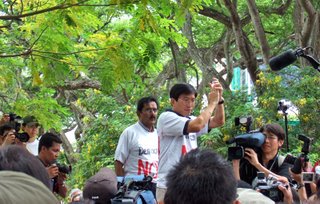
But as I approached the area i can see many police hanging around. They walked in pairs and were going around telling the people gathered to disperse or go home. The uncle in front of me was approached and not happy and said back "thank you for your advice, I want to walk around in the park cannot meh?!" Haha the mata diam diam and walked away liao. I sms Derek he also never reply... I think he humji kia see police only balls shrink liao, must have played me out... KNN so typical of Sporeans!
All over the place also got many plain clothes mata. They were easy to spot. For a Sat they were dressed a little too formal. Some of them got wear those earpieces or carry video cameras. They take pictures and video everything. KNN i think i sure tio liao, a yandao kia like me they sure jealous and zoom in on me one HAHAHA!!
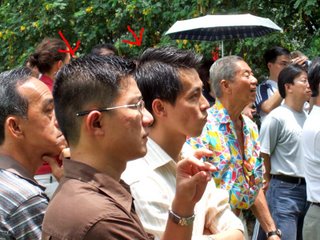 This two here try to act casual but they are quite nervous and fidgety. The one on the left keep twitching his fingers without realising it.
This two here try to act casual but they are quite nervous and fidgety. The one on the left keep twitching his fingers without realising it.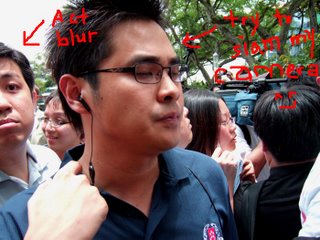
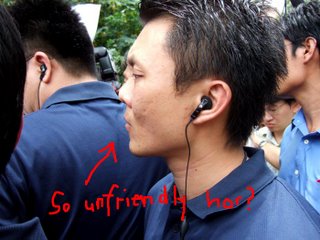
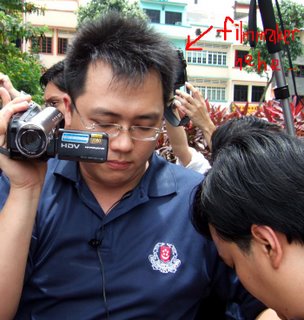
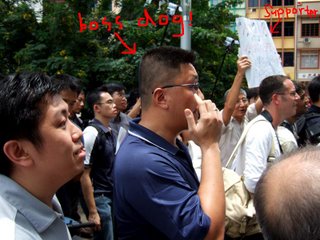
Haha so funny, when I went nearer SDP was singing birthday song to LKY. Apparently today is the despot's birthday! Hahaha! Check out this supporter's shirt ~~
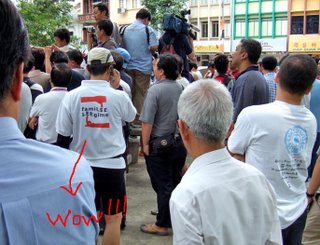
Anyway after a while Dr Chee and 4 others wearing T-shirts with democracy and freedom slogans decided to start their protest walk, and that's when I saw how the mata moved in on them.
The SDP did not break any law, therefore the police cannot arrest them. There was a large media presence, both local and foreign, so i think mata also a bit gan cheong. So what the police did was to break the law themselves! They forcefully formed a human circle around the group and just BLOCK the group from moving. They act blur and pretended never hear the appeals from Dr Chee and some members of the public asking them to DON'T BLOCK people from walking. Wah I must say the police behaviour is really damn disgusting. Others obviously felt the same and many were calling the police running dogs or poodle force and other names. Even when Dr Chee said he wanted to go home or this or that the poodles also refused to move. Wah lan really first world gahmen! So shamefull!!
I squeezed in and took a picture. Can see all the act blur faces? KNN got one mat poodle try to look tough hahaha! Who is he trying to scare?
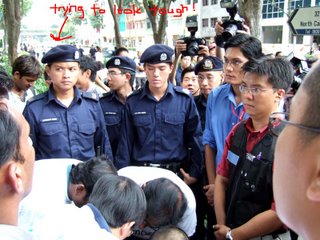
Later the SDP group managed to break out into smaller groups or individuals but the poodles continue to harass each and everyone of them. Here is Dr Chee's sister being surrounded and blocked by poodle bitches at Circular road.
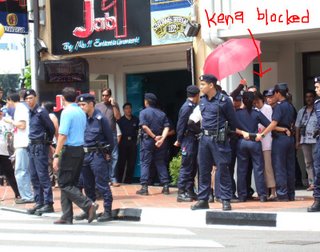
The SDP group was trying to make their way to Parliament House. Of course they failed. What they succeeded in attracting a lot of attention. Derek thinks that what the police did was clearly illegal (I found Derek amongst the crowd later). How can they behave the way they did? In order to please their masters they couldn't give a shit to their duties as civil servants. Instead they trample on and bully harmless and innocent S'poreans. At one stage i heard Dr Chee's sister wanted to go toilet and yet the poodles refused to let her go, so bloody ridiculous! Dr Chee himself never got out of Hong Lim park! The poodles blocked him all the way, really unbelievable.
At around 3pm lidat we ourselves buay tahan liao, sibei hungry so we left and went makan. When we left they were still stuck lidat, i wonder how long they will stay this way?
KNNBCCB wah lan i really feel sad for my country and dunno what to say. It is clear that the police is intruding into S'poreans rights and private space. Instead of protecting the citizens, they are protecting the interests of PAP gahmen and politicians. Everything that was once good in this country is now totally fucked and corrupted. Like what Derek likes to say "its gone to the dogs"... how very true.
Thursday, September 14, 2006
Would you smile ...
Friday, September 08, 2006
Everyone do NS meh??
Aiya the usual things lor... why he cannot defer, very disruptive to career and work, why SAF never get back to him in time etc etc. It is good that he wrote in to the papers becoz like this that useless SAF public relations guy call simi Bend-a-dick something will have to get off his fat ass to do some paperwork and respond. Then again maybe not, this lanjiao Colonel can just ask some chao recruit NSF to write for him. Knn SAF officers really jiat liao bee one.
However before Bend-a-dick's reply can come out (Slow Ass Force you know! sure take a week at least), some stupid fucker wrote to the 140th liao. I cut-and-paste for you all to see...
Sep 8, 2006
ICTs may be inconvenient but defence is everyone's duty
I REFER to Mr Tan Thiam Huat's letter, 'NSman called up for first ICT at age 36' (ST, Sept 6).
While I agree with him that it is indeed a fiasco to be starting one's in-camp training (ICT) at such an age, I have my reservations about the other points raised.
To put it simply, everyone has a role to play in our country's defence, be it a manager high up the organisational hierarchy or a humble cleaner.
While ICTs may result in inconveniences,we have to recognise that defence is the basic foundation of a stable country, one where businesses flourish and our loved ones sleep in peace.
Lastly, while Mr Tan was surprised to receive his first ICT notification recently, I am even more surprised that he realised only now that he had military obligations to fulfil.
Ng Chun Shiong
Haizzz... no wonder Sg is going to the dogs and Foreign Trash are mistaken for talents and welcomed by the stupid gahmen. Stupid fuckers like this Ng Chun Shiong really cannot think critically. I bet he is one of those 四肢发达,头脑简单 kena tio brainwashed types.
Look what google throw up about Mr Ng? Here and here. If this is the same Ng who wrote the letter, now we know why he write the way he write and why he cannot think. This fucker is an officer in the SAF! As all recruits and anyone who has gone through NS will know, the officer breed is the henchmen of the MINDEF and gahment. After 9 months of brainwashing, otherwise known as officer training course, these fucktards come out thinking they deserve respect from the other ranks when they have earned none. Their leadership skills amount to Eye Power and NATO (No Action Talk Only) and to get things done they simply 'pull rank' and lord over the rest, and they themselves dun lead by example. But when faced with another of higher rank, suddenly they will all cower and be deferential. Even when the bigger shot is talking cock and rubbish they all also diam diam and dare not go with common sense. The SAF calls this discipline, what a fucking joke! Incidentally all scholars are mostly officers, which explains why the gahmen is full of fucktards and paper generals who expect people to respect them when they are all jiat liao bee and kena sai!
See the other part about S'pore Book of Records? Fastest time to go through a spiderweb, WAHAHAHA!!!! How fucking bo liao can this Ng be? If he likes SAF so much why don't he use the time to volunteer for extra duties and ICT? What kind of lanjiao record is this?! Oh i forgot, he is an SAF-trained officer, so of course best at wayang and think up useless stunts to make a name for himself. Pui!
Even if this Ng is someone else, I look at his letter already can see loopholes liao. He say everyone has a role to play in a country's defence. Really ah?? Foreigners got play role? PRs leh? Charbor got do NS?? Hey Mr Ng, fuck you understand! We talking about In-Camp training , so please don't try to bullshit and lump under such a general thing as defence! Knn I see rubbish on the public floor I will go pick up one u know? Can count as playing a role anot? Can replace ICT anot? I go have sex and make more babies for country can count as a role anot? My ICT can do in geylang instead of cheebye SAF camps? HAhahaa!
Then further down u say defence is basic foundation of a stable country. Knn, thats why i say you really no brain. This kind of general statement where got meaning one? You trying to bluff primary skool ginnas issit? Or are you trying to become a PAP politican? I can name you so many countries that are stable and yet they don't have NS, so what the fuck crap are you talking about? Wake up your fucking idea understand!
Actually Mr Ng, you dun say i also know why you write in.... Becoz u got hidden agenda! You jealous other people want to siam ICT mah, whereas you chao officer lan lan must serve until 45 yrs old. I bet secretly inside you very too-lan about this. But outwardly you must por lumpar SAF and put up a wayang show. Fucking bastards like you outside I see one time hoot one time!!
Sunday, September 03, 2006
Mock NDP and Ephraim Loy
First thing,
an article titled 'It's Not Funny, says Mindef', refering to video clips on youtube that make fun of SAF and this one which I posted few months back. If you are a slow turtle like the 140th and those stupid 66.6 idiots out there and have not seen it, click my link and have a good laugh.
Go ahead click, 别客气... faster click lah.
Ok now that you have watched it, you tell me funny anot? Knn I cho kao pengz man! In fact I salute those kids in the video whereas I dun give a fuck salute to any SAF officers. Pui!!!
But hor 140th buay song wor. Dr Bernard Loo, some professor at the Institute of Defence and Strategic Studies said, "They may have no malicious intent, but they don't seem aware of the ramifications of their actions" and was quoted that the mock parade undermines a national symbol.
Simi lan jiao national sysmbol?!! The useless Prataman is national symbol meh?? More like national disgrace!!! Useless fat piece of lard take home more than $2.6million in salary to do fuck shit! Of course must mock him! Useless big fat rubber stamp is supposed to protect our reserves yet he happily unlock it for GLCs and Temasek to tap them. Somemore he got a dirty past. Do you know that this fucker worked for the Japanese Kempeitei during WW2 just like Old Lee? No wonder Old Lee so buddy buddy with him and hand him the president chair, knn all fucking traitors to Sporeans!
Ok strictly speaking the above video got nothing to do with Mindef. So actually 140th was also refering to this other lagi best clip. Go see lah.. it is actually not very funny but good effort lor, they trying to simulate how to stop an intruder procedure mah. But then Mindef buay song wor and 140th say 'other NSmen who saw the videos were even more critical of their comrades' actions' blah blah. A PAP abnn woman MP also criticised that such thing will tarnish SAF image.
Knn SAF got simi lan jiao image you tell me! Wayang image only wat! All con job bullshit one wat! Cheebye PAP woman you fucking go do NS first before you open your cheebye mouth and talk!! You wan to criticise you first get off your fat ass and run 2.4km first! Chao cheebye pui!!!!
Ok second thing,
Yes it's the cheebye kia Ephraim Loy. Actually lim pei so long never humtum this PAP bootlicker dog aka por lumpar kia liao, want to give him chance to die a peaceful death mah. But then suddenly this recruit's SAF-trained eyes very sharp zoom in on his name in the Shit Times.
AIYOOOOOO!!!!! Confirm liao lor! See the headline 'Minister George Yeo's views appear on Young PAP Member's site'. See I told you all liao, all this people who write to ST Forums and praise gahmen and PAP policies one is confirmed PAP members. Now zhun zhun tio liao lor, Ephraim Loy is a Young PAP member! Knn looks like he is escalating his por lumpar antics to a new level and even got a minister dog to come and lick lick him! Wah lan see his face really wan to make me puke up my breakfast. I think it is true, those religious people is right! There is a God, and God is damn fair. All these fuck face toads and PAP scums all one kind of lan jiao ugly face, for example like this other PAP dog here. They cannot make it in life, so the only way for them to rise is to suck cock and por PAP lumpar. Knn all got hidden agenda one!
Monday, August 28, 2006
AHM
Somemore as usual in typical SAF fashion the whole thing is badly organised. Lim pei is prepared to run one (10km nia hehe) but wah lan eh the human traffic is jammed up all the way... Nabeh I have to walk at least 20 mins stuck in human jam until the ECP part than can start jogging. Even then it is start stop start stop lidat. Cheebye lah next time you know so many ppl participating fucking designate lanes for those running and walking one mah! Every year is the same fuck shit, SAF just never learn and fucking boh chup! Out of 10km I think I walked half of it hahaha!
To show proof of my contribution to nation building, see the result of my SAF running shoes after the "run"... the front part "open mouth" liao.
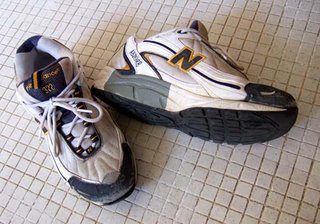
Anyway recently the PM talked a lot of cock (and cockles) during the National Day Rally which made many S'poreans buay song... (ok actually only the 33.3% buay song nia, the 66.6 is either fucking heck care or still feeling orgasmic after getting their progress package)
Anyway my friends who watched the TV telecast told me it is damnnnnnnn boring, with the typical cold and lame jokes and the por lumpar audience clapping and lapping up every fuck thing the kuku PM say.
This reminds me of what Winston Churchill once said... "What the people really want to hear is the truth -it is the exciting thing - to speak the truth."
So now we know why the kuku PM is so boring....
Wednesday, August 02, 2006
Truman says...
"Whenever you have an efficient government you have a dictatorship."
"You can't get rich in politics unless you're a crook."
- Harry S Truman
Friday, July 21, 2006
Newsflash: PAP MP kena whack!!!
.
..
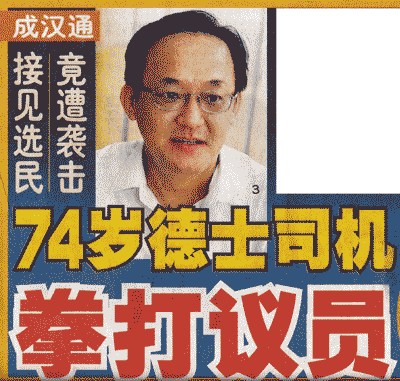
The PAP dog Seng Han Thong kena punched by a 74 yr old taxi driver! WAHAHAHAHA!!!
More details here...
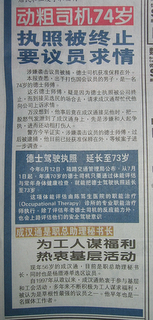 Hahahaha, really made my day man! Knn see his kind of lanjiao face already tulan liao... Serve him right!
Hahahaha, really made my day man! Knn see his kind of lanjiao face already tulan liao... Serve him right! And bravo to the 74 yr old! He is a 人民英雄!
Tuesday, July 11, 2006
Part of your life
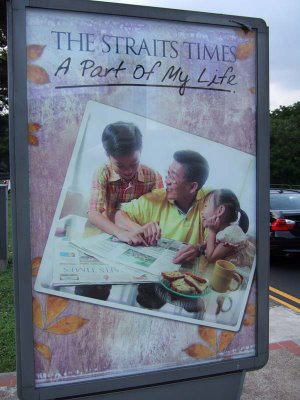
Of course the Shit Times is part of S'poreans' lives. S'poreans have no choice bcoz its a fucking monopoly!
But take a closer look at the poster and you will see something interesting. Look at what is printed on the papers itself at the bottom of the poster...
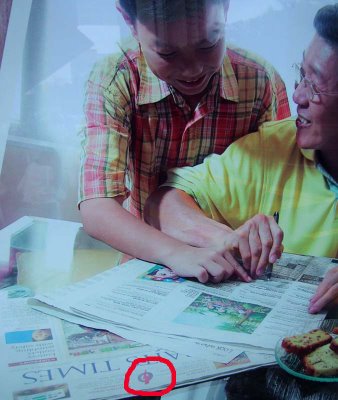
See it? A lightning logo!! Damn obvious right?? Hahahaha! But it is very appropriate. Everyone knows that the PAP wants to be part of your lives! It wants to dominate S'poreans and their minds, make them think that without the PAP life will be impossible! Thru propaganda sheets like the Shit Times and TODAY the PAP purposely blurs the line between political party, govt, and country... until the three are interchangeable and when S'poreans think of country and govt they straight away associate it with the Pay And Pay party. So if you criticize the PAP it means you are criticising the country and therefore you are unpatriotic or a traitor! This is the kind of shit propaganda they have been planting for decades in our minds. And now the Shit Times is subconciously brainwashing you that they are the PAP, so if you criticise them you are criticising the PAP, the govt and the country, and you are a traitor! HAHAHA!
Whether the logo is intentionally put there in the advertisement or not I dunno lah. But how can the advertising people or SPH not see it? So can it be just coincidence or a little joke? I don't think so, I think it is deliberate and those PAP dogs in SPH want it this way.
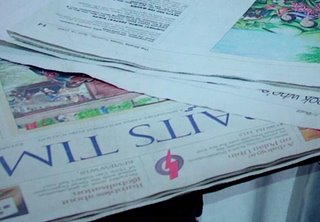
Monday, July 03, 2006
K Bhavani...
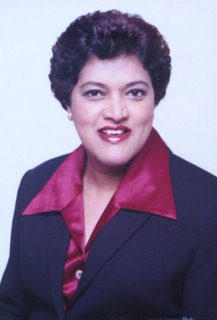
More information about her here.
Mr Brown tio kan liao
hehe sibei song... i know Ephraim you are lurking and reading this, so fuck you mothercheebyebastardranjiao one more time!!! Have you gone for plastic surgery or not, your lanjiao face whole world know liao so better careful hor? MUAHAHAHA!!
..
OK now coming back to Mr Brown... Last week the fucking greedy PAP gahmen announce they Profits No Enough again, want to raise taxi fares and electricity bills. Then come Oct bus fares also going up liao. Hear this kind of lanjiao news who won't be angry? Unless you are one of those useless PAP ministers and their jiat liao bee prata man gang then dun say. So Mr Brown wrote a not-so-funny article and TODAY published it. And today the PAP gahmen Ministry of Propaganda shoot one angry reply back...
Distorting the truth, mr brown?
When a columnist becomes a 'partisan player' in politics
Letter from K BHAVANI
Press Secretary to the Minister for Information, Communications and the Arts
Your mr brown column, "S'poreans are fed, up with progress!" (June 30) poured sarcasm on many issues, including the recent General Household Survey, price increases in electricity tariffs and taxi fares, our IT plans, the Progress Package and means testing for special school fees.
The results of the General Household Survey were only available after the General Election. But similar data from the Household Expenditure Survey had been published last year before the election.
There was no reason to suppress the information. It confirmed what we had told Singaporeans all along, that globalisation would stretch out incomes.
mr brown must also know that price increases in electricity tariffs and taxi fares are the inevitable result of higher oil prices.
These were precisely the reasons for the Progress Package — to help lower income Singaporeans cope with higher costs of living.
Our IT plans are critical to Singapore's competitive position and will improve the job chances of individual Singaporeans. It is wrong of mr brown to make light of them.
As for means testing for special school fees, we understand mr brown's disappointment as the father of an autistic child. However, with means testing, we can devote more resources to families who need more help.
mr brown's views on all these issues distort the truth. They are polemics dressed up as analysis, blaming the Government for all that he is unhappy with. He offers no alternatives or solutions. His piece is calculated to encourage cynicism and despondency, which can only make things worse, not better, for those he professes to sympathise with.
mr brown is entitled to his views. But opinions which are widely circulated in a regular column in a serious newspaper should meet higher standards. Instead of a diatribe mr brown should offer constructive criticism and alternatives. And he should come out from behind his pseudonym to defend his views openly.
It is not the role of journalists or newspapers in Singapore to champion issues, or campaign for or against the Government. If a columnist presents himself as a non-political observer, while exploiting his access to the mass media to undermine the Government's standing with the electorate, then he is no longer a constructive critic, but a partisan player in politics.
The fucking greedy PAP minister and their useless civil servant dogs are really 强词夺理 and 无耻下贱. Want to shoot reply also use some brains and EQ lah. The entire reply so many glaring loopholes and crap logic until I also tired to point them out. Sometimes I wonder these idiots are paid so much money for fuck?! Just keep going round in circles and spewing the same vomit from the past 20 years they think will convince S'poreans? And the best part of this no-do-NS bitch Bhavani's reply is the last para - if she says Mr Brown is a partisan player in politics, than what about herself who holds and spews her PAP master's views and politics? That's not biased and partisan?? If she and her master wants people to offer solutions and alternatives then they should give up their huge salaries paid by S'porean taxpayers. They expect freebies?! This is Singapore, stupid! And Mr Brown should charge them 5% GST for his effort and a further 10% surcharge for "rising costs due to higher oil prices". HAHAHAHA!!
And the saddest thing of all is this: just about everyone knows who Mr Brown is. Yet Bhavani "pretends" she doesn't know and wants Mr Brown to 'step out'. This is yet another standard old trick by the PAP designed to discredit those who hold different views from them. It only works in the traditional media environment which the PAP has 100% control. So Mr Brown should just ignore her and the Ministry of Propaganda's 140th media, instead respond in kind via their highly popular podcasts and see the minister of propaganda and his Bhavani bitch lan lan suck thumb! The internet rules and the PAP can do jack shit about it! HAhahah!

